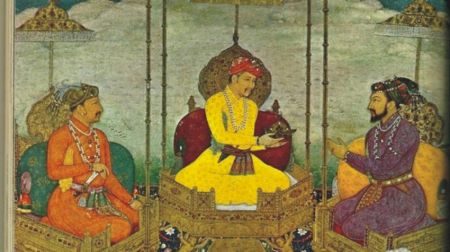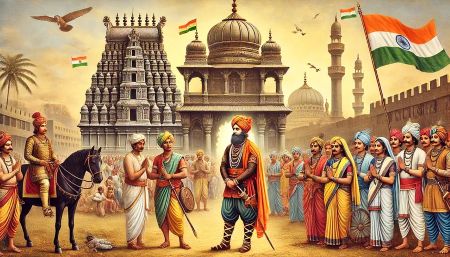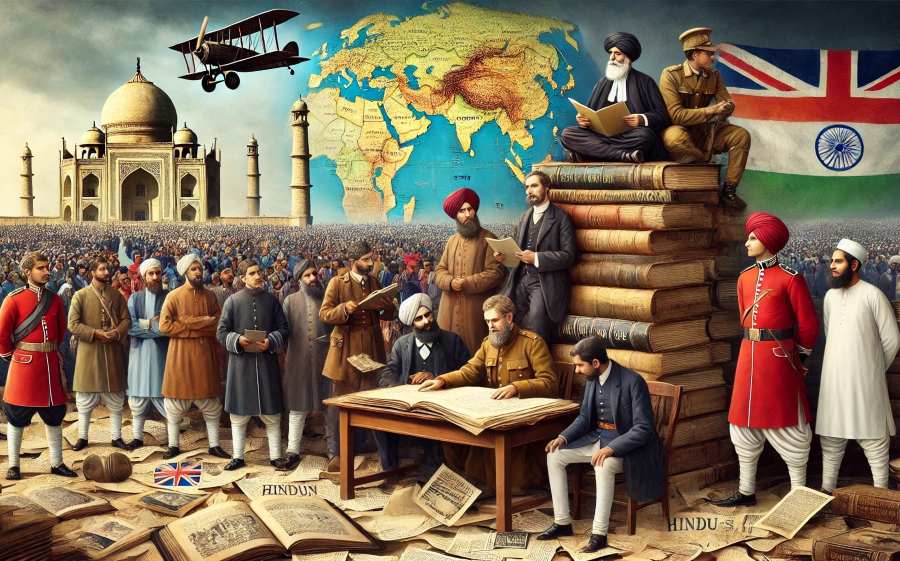Uncovering the Truth Behind Colonial Misinformation and Its Lasting Impact
The British rulers employed a “divide and rule” policy, fostering hostility between Hindus and Muslims. To serve this purpose, many historians loyal to the British distorted our history books.
One striking example is Tipu Sultan, the ruler of Mysore in South India. Some have portrayed him as an anti-Hindu tyrant.
But what is the truth about Tipu Sultan? Was he secular or communal? Before addressing this question, it is important to consider some facts.
The initial Muslim invaders who entered India did indeed destroy many Hindu temples. For instance, Mahmood Ghazni destroyed the Somnath temple.
However, their descendants—such as Akbar (who was not an invader, though his grandfather Babur was)—became local Muslim rulers in India. Far from destroying temples, they granted patronage to them and celebrated Hindu festivals like Holi and Diwali.

These rulers governed populations that were 80–90% Hindu. They understood that if they destroyed temples or oppressed Hindus, revolts and turmoil would ensue—something no ruler desires.
Therefore, in their own interest, almost every local Muslim ruler fostered communal harmony. They granted funds to Hindu temples, celebrated Hindu festivals, and included Hindus in their administration.
For instance, the Mughal emperors (with some controversy surrounding Aurangzeb), as well as the Nawabs of Awadh, Murshidabad, Arcot, and others, promoted such harmony. The Nawab of Awadh even organized Ramleela and celebrated Holi and Diwali.
Similarly, Tipu Sultan granted annual funds to 156 Hindu temples, appointed a Hindu, Purnaiya, as his Prime Minister, and had a Hindu, Krishna Rao, as his commander-in-chief. Tipu also sent 30 respectful letters along with grants to the Shankaracharya of Shringeri (see the online resource History in the Service of Imperialism, a speech by Prof. B. N. Pandey in the Rajya Sabha in 1977).
The first part—detailing how Muslim invaders destroyed temples—has been prominently highlighted in our history books. However, the second part—covering a much longer period, during which the descendants of these invaders fostered communal harmony, granted land for Hindu temples, and celebrated Hindu festivals—was deliberately suppressed by the British. Their objective was to sow communal hatred and incite conflict between Hindus and Muslims.
If you read History in the Service of Imperialism by Professor B. N. Pandey (available online), you will understand how British policy was designed to turn Hindus and Muslims against each other.
For instance, Dr. Pandey recounted that in 1928, when he was a Professor of History at Allahabad University, some students brought him a book by Professor Harprasad Shastri, a Professor of Sanskrit at Calcutta University. This book claimed that Tipu Sultan forced 3,000 Brahmins to convert to Islam under the threat of death, and that these Brahmins chose suicide over conversion.
Upon reading this, Professor Pandey wrote to Professor Shastri, requesting the source of this claim. Professor Shastri replied that his source was the Mysore Gazetteer.
To verify this, Professor Pandey then wrote to Professor Srikantaiah, a History Professor at Mysore University. Professor Srikantaiah responded that this claim was entirely false. Having extensively researched the subject, he found no such mention in the Mysore Gazetteer.

Tipu Sultan
In fact, the correct version was quite the opposite: Tipu Sultan granted annual funds to 156 Hindu temples and sent donations to the Shankaracharya of Shringeri. Far from being communal, Tipu was thoroughly secular.
In 1791, during the Third Anglo-Mysore War, Parshuram Bhave (Bhau), a Maratha general, led an attack on Tipu’s richest province, Bednur. Maratha horsemen under Raghunathrao Patwardhan plundered the Shringeri Monastery, desecrated the shrine of Sri Sharada Devi, and killed or wounded many people.
Shocked by this vandalism, the Jagadguru of Shringeri, Sri Sacchidananda Bharati III, was forced to flee to Karkala, a temple town about 50 miles south of Shringeri. Helpless and despondent, the Shankaracharya petitioned Tipu Sultan for help.
Tipu expressed his indignation and grief over the attack, writing to the Shankaracharya:
“People who have sinned against such a holy place are sure to suffer the consequences of their misdeeds at no distant date in this Kali age, in accordance with the Sanskrit verse: ‘Hasadbhih kriyate karma rudadbhir-anubhuyate’ (People commit evil deeds smiling but suffer the consequences in agony).”
Tipu immediately ordered his army to repel the Maratha invaders and wrote a letter to the Shankaracharya on July 6, 1791, offering his support. The letter read:
The Honourable Shankaracharya Shringeri Shri Sacchidananda Swamigal, bestowed with Shrimat Param Hansa,
We received your letter and have understood the gravity of the matter. We have noted that the cavalry of the Maratha king attacked Sringeri and beat the Brahmins and other people, removed the idol of the Goddess Sharda Ammanavaru (Mother), and looted the valuables belonging to the Shringeri Math. We have also noted that four disciples belonging to the Shringeri Math had to take shelter at Karkala and that the idol of Shringeri Sharda Ammanavaru was consecrated in ancient times. If this idol has to be consecrated again, the support of the government is needed. The reconsecration of the deity will be performed along with mass feeding by the requisite amount provided by the Government.
Those who have committed such atrocities will suffer the consequences as stated in the Sanskrit shloka: ‘People do evil smiling but will suffer the penalty in torments of agony — Hasadhvi Kriyathe Karma Raudhrir Anubhuyathe’. Upon hearing of the attack, the Sarkar has sent an elephant with its Mahavat, Ahammed. The Asaf of the city has been ordered to get a palanquin made for the Math and pay 200 rahathis in cash and 200 rahathis for paddy for the consecration of the idol of Sri Sharada Ammanavauru, and carry out appropriate measures for the consecration of the idol. He shall send me a report immediately.
We are sending a heavy sari (worked in gold) and a blouse piece for the Goddess Sharada Ammanavaru, and a pair of shawls for you. Please write upon receiving them. An order is sent to the Asaf of the town to deal with the problems of the Math. Contact him.
Date: 26, month Samarisala Babarabadhi, Year San 1219, Mahammad, Virodhikrita Samvat Ashadha Bahula 12.
Writer: Narasaiah
Signed: Nabi Malik
A collection of about 30 letters, written in Kannada and exchanged between Tipu Sultan’s court and the Shringeri Shankaracharya, was discovered in 1916 by the Director of Archaeology in Mysore. These letters confirm Tipu’s role in protecting and supporting Hindu religious institutions.

Tipu History
Tipu’s close relationship with Shringeri did not begin with the Maratha sack of the town; it had started much earlier, in 1785, when he issued a Nirupa (decree), reaffirming that Shringeri would remain a tax-free territory with full jurisdiction over its land and laws.
Near Tipu’s palace in Seringapatam stands the ancient Ranganathaswamy Temple, built around 1000 A.D., which still exists today. If Tipu had been communal, would he not have demolished it? Instead, he made generous offerings to it.
Tipu Sultan’s treasurer was Krishna Rao. Shamaiya Iyengar served as his Minister of Post and Police, while his brother, Ranga Iyengar, was also an officer. Purnaiya held the crucial position of Mir Asaf. His chief agents at the Mughal court were Moolchand and Sujan Rai, and his chief Peshkar was Suba Rao—all Hindus.
Prof. Srikantaiah of Mysore University identified 156 Hindu temples that Tipu regularly funded. Documents, including grant deeds and correspondence, confirm that he donated jewelry and land to several temples. Between 1782 and 1799, Tipu Sultan issued 34 sanads (deeds) of endowment to temples in his domain and presented many with silver and gold ornaments.
B.A. Saletare described Tipu Sultan as a defender of Hindu dharma. He patronized temples such as the one at Melkote, where he issued a Kannada decree ensuring that Shrivaishnava invocatory verses continued to be recited in their traditional form. The temple at Melkote still possesses gold and silver vessels inscribed with dedications from Tipu Sultan.
This deliberate falsification of our history books was intended to poison the minds of Hindu children from an impressionable age, instilling hatred towards Muslims. Such poison, once implanted, is difficult to remove later. Many of our history books have been distorted in this manner.
Why was Tipu—a staunch secular king—later demonized and branded communal? The obvious reason is that he fought the British to the last. It was British historians and their faithful Indian followers who perpetrated this misrepresentation.
It is time we rewrite our history books correctly and acknowledge that, until 1857, India had no significant communal problem. A composite culture had developed, with Hindus and Muslims living amicably like brothers and sisters, often participating in each other’s festivals. Hindus joined Eid and Muharram celebrations, while Muslims participated in Holi and Diwali.
Communalism was injected into our body politic by the British policy of divide and rule after they suppressed the Great Mutiny of 1857, in which Hindus and Muslims fought together against them. The details of this manipulation are further explored in my article, The Truth about Pakistan.
This divisive policy has been continued by certain vested interests even after 1947. ![]()
Also Read: The Controversial Revisions in Indian School Textbooks
Disclaimer : PunjabTodayNews.com and other platforms of the Punjab Today group strive to include views and opinions from across the entire spectrum, but by no means do we agree with everything we publish. Our efforts and editorial choices consistently underscore our authors’ right to the freedom of speech. However, it should be clear to all readers that individual authors are responsible for the information, ideas or opinions in their articles, and very often, these do not reflect the views of PunjabTodayNews.com or other platforms of the group. Punjab Today does not assume any responsibility or liability for the views of authors whose work appears here.
Punjab Today believes in serious, engaging, narrative journalism at a time when mainstream media houses seem to have given up on long-form writing and news television has blurred or altogether erased the lines between news and slapstick entertainment. We at Punjab Today believe that readers such as yourself appreciate cerebral journalism, and would like you to hold us against the best international industry standards. Brickbats are welcome even more than bouquets, though an occasional pat on the back is always encouraging. Good journalism can be a lifeline in these uncertain times worldwide. You can support us in myriad ways. To begin with, by spreading word about us and forwarding this reportage. Stay engaged.
— Team PT

